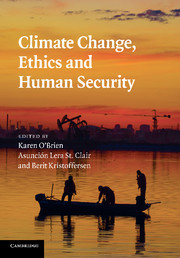Description
Climate Change, Ethics and Human Security
Coordinators: O'Brien Karen, St. Clair Asunción Lera, Kristoffersen Berit
Approaches climate change as an issue of human security and ethical obligation, arguing for a more equitable and sustainable future.
Language: English
Subject for Climate Change, Ethics and Human Security:
Climate Change, Ethics and Human Security (paper)
Publication date: 06-2014
246 p. · 17x24.4 cm · Paperback
Publication date: 06-2014
246 p. · 17x24.4 cm · Paperback
Climate Change, Ethics and Human Security
Publication date: 07-2010
246 p. · 17.9x25.4 cm · Hardback
Publication date: 07-2010
246 p. · 17.9x25.4 cm · Hardback
Description
/li>Contents
/li>Biography
/li>
Presenting human security perspectives on climate change, this volume raises issues of equity, ethics and environmental justice, as well as our capacity to respond to what is increasingly considered to be the greatest societal challenge for humankind. Written by international experts, it argues that climate change must be viewed as an issue of human security, and not an environmental problem that can be managed in isolation from larger questions concerning development trajectories, and ethical obligations towards the poor and to future generations. The concept of human security offers a new approach to the challenges of climate change, and the responses that could lead to a more equitable and sustainable future. Climate Change, Ethics and Human Security will be of interest to researchers, policy makers, and practitioners concerned with the human dimensions of climate change, as well as to upper-level students in the social sciences and humanities interested in climate change.
Foreword Heide Hackmann; Preface Karen O'Brien, Asunción Lera St. Clair and Berit Kristoffersen; Part I. Framings: 1. The framing of climate change Karen O'Brien, Asunción Lera St. Clair and Berit Kristoffersen; 2. The idea of human security Des Gasper; 3. Climate change science and policy in the South Pacific, as if people mattered Jon Barnett; Part II. Equity: 4. A 'shared vision'? Why inequality should worry us J. Timmons Roberts and Bradley C. Parks; 5. Fair decision making in a new climate of risk W. Neil Adger and Donald R. Nelson; Part III. Ethics: 6. Ethics, politics and the global environment Desmond McNeill; 7. Human rights, climate change and discounting Simon Caney; 8. Climate change: a global test for contemporary political institutions and theories Stephen Gardiner; Part IV. Reflexivity: 9. Linking sustainable development with climate change adaptation and mitigation Livia Bizikova, Sarah Burch, John Robinson and Stewart Cohen; 10. Global poverty and climate change: the responsibility to protect Asunción Lera St. Clair; 11. Security for whom? Social contracts in a changing climate Bronwyn Hayward and Karen O'Brien; 12. Towards a new science on climate change Karen O'Brien, Asunción Lera St. Clair and Berit Kristoffersen; Index.
Dr Karen L. O'Brien is a Professor in the Department of Sociology and Human Geography at the University of Oslo, Norway and chair of the Global Environmental Change and Human Security (GECHS) project of the International Human Dimensions Programme on Global Environmental Change (IHDP). Her research focuses on climate change vulnerability and adaptation, on interactions between globalization and climate change, and on the role that values and worldviews play in responding to environmental change. She currently leads a large social-science based project on The Potentials of and Limits to Climate Change Adaptation in Norway (PLAN). She has recently published a book with Robin Leichenko on Environmental Change and Globalization: Double Exposures (2008) that received the 2008 AAG Meridian Book Award for the Outstanding Scholarly Work in Geography. She was a lead author on the Intergovernmental Panel on Climate Change (IPCC) Fourth Assessment Report and the Special Report on Managing the Risks of Extreme Events and Disasters to Advance Climate Change Adaptation. She is on the editorial board of Global Environmental Change, the Annals of the Association of American Geography, and Ecology and Society, and on the steering committee of the Comparative Research Program on Poverty (CROP), the Norwegian Global Change Committee, and Concerned Scientists-Norway.
Asunción Lera St. Clair is Professor of Sociology at the University of Bergen, Norway and Scientific Director of the Comparative Research Program on Poverty (CROP), one of the leading programs of the International Social Science Council (ISSC); co-leader (with Victoria Lawson) of the WUN Critical Global Poverty Studies Research group; Vice-President of the International Development Ethics Association (IDEA); board member of the Rafto Foundation for Human Rights and member of the editorial boards of various international journals and other international organisations. Her work is primarily interdisciplinary, focusing on
Asunción Lera St. Clair is Professor of Sociology at the University of Bergen, Norway and Scientific Director of the Comparative Research Program on Poverty (CROP), one of the leading programs of the International Social Science Council (ISSC); co-leader (with Victoria Lawson) of the WUN Critical Global Poverty Studies Research group; Vice-President of the International Development Ethics Association (IDEA); board member of the Rafto Foundation for Human Rights and member of the editorial boards of various international journals and other international organisations. Her work is primarily interdisciplinary, focusing on
© 2024 LAVOISIER S.A.S.




